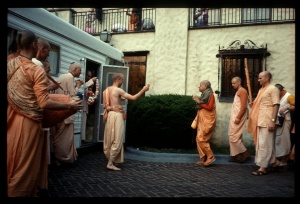CC Madhya 13.80: Difference between revisions
No edit summary |
(Vanibot #0054 edit - transform synonyms into clickable links, which search similar occurrences) |
||
| Line 19: | Line 19: | ||
<div class="synonyms"> | <div class="synonyms"> | ||
''na'' | ''[//vanipedia.org/wiki/Special:VaniSearch?s=na&tab=syno_o&ds=1 na]'' — not; ''[//vanipedia.org/wiki/Special:VaniSearch?s=aham&tab=syno_o&ds=1 aham]'' — I; ''[//vanipedia.org/wiki/Special:VaniSearch?s=vipraḥ&tab=syno_o&ds=1 vipraḥ]'' — a ''brāhmaṇa; ''[//vanipedia.org/wiki/Special:VaniSearch?s=na&tab=syno_o&ds=1 na]'' — not; ''[//vanipedia.org/wiki/Special:VaniSearch?s=ca&tab=syno_o&ds=1 ca]'' — also; ''[//vanipedia.org/wiki/Special:VaniSearch?s=nara&tab=syno_o&ds=1 nara]-[//vanipedia.org/wiki/Special:VaniSearch?s=patiḥ&tab=syno_o&ds=1 patiḥ]'' — a king or ''kṣatriya; '' [//vanipedia.org/wiki/Special:VaniSearch?s=na&tab=syno_o&ds=1 na]'' — not; ''[//vanipedia.org/wiki/Special:VaniSearch?s=api&tab=syno_o&ds=1 api]'' — also; ''[//vanipedia.org/wiki/Special:VaniSearch?s=vaiśyaḥ&tab=syno_o&ds=1 vaiśyaḥ]'' — belonging to the mercantile class; ''[//vanipedia.org/wiki/Special:VaniSearch?s=na&tab=syno_o&ds=1 na]'' — not; ''[//vanipedia.org/wiki/Special:VaniSearch?s=śūdraḥ&tab=syno_o&ds=1 śūdraḥ]'' — belonging to the worker class; ''[//vanipedia.org/wiki/Special:VaniSearch?s=na&tab=syno_o&ds=1 na]'' — not; ''[//vanipedia.org/wiki/Special:VaniSearch?s=aham&tab=syno_o&ds=1 aham]'' — ''I; ''[//vanipedia.org/wiki/Special:VaniSearch?s=varṇī&tab=syno_o&ds=1 varṇī]'' — belonging to any caste, or ''brahmacārī'' (A ''brahmacārī'' may belong to any caste. Anyone can become a ''brahmacārī'', or lead a life of celibacy.); ''[//vanipedia.org/wiki/Special:VaniSearch?s=na&tab=syno_o&ds=1 na]'' — not; ''[//vanipedia.org/wiki/Special:VaniSearch?s=ca&tab=syno_o&ds=1 ca]'' — also; ''[//vanipedia.org/wiki/Special:VaniSearch?s=gṛha&tab=syno_o&ds=1 gṛha]-[//vanipedia.org/wiki/Special:VaniSearch?s=patiḥ&tab=syno_o&ds=1 patiḥ]'' — householder; ''[//vanipedia.org/wiki/Special:VaniSearch?s=no&tab=syno_o&ds=1 no]'' — not; ''[//vanipedia.org/wiki/Special:VaniSearch?s=vana&tab=syno_o&ds=1 vana]-[//vanipedia.org/wiki/Special:VaniSearch?s=sthaḥ&tab=syno_o&ds=1 sthaḥ]'' — ''vānaprastha'', one who, after retirement from family life, goes to the forest to learn how to be detached from family life; ''[//vanipedia.org/wiki/Special:VaniSearch?s=yatiḥ&tab=syno_o&ds=1 yatiḥ]'' — mendicant or renunciant; ''[//vanipedia.org/wiki/Special:VaniSearch?s=vā&tab=syno_o&ds=1 vā]'' — either; ''[//vanipedia.org/wiki/Special:VaniSearch?s=kintu&tab=syno_o&ds=1 kintu]'' — but; ''[//vanipedia.org/wiki/Special:VaniSearch?s=prodyan&tab=syno_o&ds=1 prodyan]'' — brilliant; ''[//vanipedia.org/wiki/Special:VaniSearch?s=nikhila&tab=syno_o&ds=1 nikhila]'' — universal; ''[//vanipedia.org/wiki/Special:VaniSearch?s=parama&tab=syno_o&ds=1 parama]-[//vanipedia.org/wiki/Special:VaniSearch?s=ānanda&tab=syno_o&ds=1 ānanda]'' — with transcendental bliss; ''[//vanipedia.org/wiki/Special:VaniSearch?s=pūrṇa&tab=syno_o&ds=1 pūrṇa]'' — complete; ''[//vanipedia.org/wiki/Special:VaniSearch?s=amṛta&tab=syno_o&ds=1 amṛta]-[//vanipedia.org/wiki/Special:VaniSearch?s=abdheḥ&tab=syno_o&ds=1 abdheḥ]'' — who is the ocean of nectar; ''[//vanipedia.org/wiki/Special:VaniSearch?s=gopī&tab=syno_o&ds=1 gopī]-[//vanipedia.org/wiki/Special:VaniSearch?s=bhartuḥ&tab=syno_o&ds=1 bhartuḥ]'' — of the Supreme Person, who is the maintainer of the ''gopīs; ''[//vanipedia.org/wiki/Special:VaniSearch?s=pada&tab=syno_o&ds=1 pada]-[//vanipedia.org/wiki/Special:VaniSearch?s=kamalayoḥ&tab=syno_o&ds=1 kamalayoḥ]'' — of the two lotus feet; ''[//vanipedia.org/wiki/Special:VaniSearch?s=dāsa&tab=syno_o&ds=1 dāsa]'' — of the servant; ''[//vanipedia.org/wiki/Special:VaniSearch?s=dāsa&tab=syno_o&ds=1 dāsa]-[//vanipedia.org/wiki/Special:VaniSearch?s=anudāsaḥ&tab=syno_o&ds=1 anudāsaḥ]'' — the servant of the servant. | ||
</div> | </div> | ||
Latest revision as of 21:42, 19 February 2024

A.C. Bhaktivedanta Swami Prabhupada
TEXT 80
- nāhaṁ vipro na ca nara-patir nāpi vaiśyo na śūdro
- nāhaṁ varṇī na ca gṛha-patir no vanastho yatir vā
- kintu prodyan-nikhila-paramānanda-pūrnāmṛtābdher
- gopī-bhartuḥ pada-kamalayor dāsa-dāsānudāsaḥ
SYNONYMS
na — not; aham — I; vipraḥ — a brāhmaṇa; na — not; ca — also; nara-patiḥ — a king or kṣatriya; na — not; api — also; vaiśyaḥ — belonging to the mercantile class; na — not; śūdraḥ — belonging to the worker class; na — not; aham — I; varṇī — belonging to any caste, or brahmacārī (A brahmacārī may belong to any caste. Anyone can become a brahmacārī, or lead a life of celibacy.); na — not; ca — also; gṛha-patiḥ — householder; no — not; vana-sthaḥ — vānaprastha, one who, after retirement from family life, goes to the forest to learn how to be detached from family life; yatiḥ — mendicant or renunciant; vā — either; kintu — but; prodyan — brilliant; nikhila — universal; parama-ānanda — with transcendental bliss; pūrṇa — complete; amṛta-abdheḥ — who is the ocean of nectar; gopī-bhartuḥ — of the Supreme Person, who is the maintainer of the gopīs; pada-kamalayoḥ — of the two lotus feet; dāsa — of the servant; dāsa-anudāsaḥ — the servant of the servant.
TRANSLATION
“‘I am not a brāhmaṇa, I am not a kṣatriya, I am not a vaiśya or a śūdra. Nor am I a brahmacārī, a householder, a vānaprastha or a sannyāsī. I identify Myself only as the servant of the servant of the servant of the lotus feet of Lord Śrī Kṛṣṇa, the maintainer of the gopīs. He is like an ocean of nectar, and He is the cause of universal transcendental bliss. He is always existing with brilliance.’”
PURPORT
This is verse 74 from the Padyāvalī, an anthology of verses compiled by Śrīla Rūpa Gosvāmī.